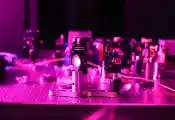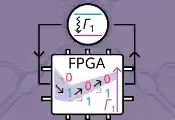ARCTIC – Scalable Cryogenic Control Technology for Quantum Processors
Quantum computing is currently seen as the most promising contender to efficiently solve problems which are completely out of reach for classical computers within reasonable timescales. Whereas research on qubits is long established, developing the control machinery is at least as important for scaled systems, yet is still in its infancy.
Project ARCTIC brings together 36 partners from industry, academia and leading RTOs to establish a complete and comprehensive European supply chain for and develop scalable, reliable, innovative control infrastructure for cryogenic quantum processors.
The main goal of ARCTIC (Advanced Research on Cryogenic Technologies for Innovative Computing) is to develop scalable cryogenic ICT microsystems and control technology for quantum processors. The technologies developed will have applications in many fields from sensing to communication, leading to important cross-fertilization that will strengthen the forming European ecosystem on cryogenic classical and quantum microsystems.
Fraunhofer IPMS takes part in the European project ARCTIC where the consortium will advance cryogenic technologies to promote quantum computing, cold CMOS computing and space applications. IPMS will focus on the electrical characterization and modelling of bipolar and CMOS transistors and memory elements at cryogenic temperatures. An emphasis will lie on high frequency, noise and defect characterization and modelling of transistors and the development of non-volatile ferroelectric memories.
In one focus, commercial FETs in 22FDX FDSOI technology will be analysed by Fraunhofer IPMS by means of an innovative high-frequency noise characterization method at cryogenics temperatures. This allows not only to model the device behaviour but also to gain new insights into the energetic position and number of electrical defects in the device. This will allow the industry to offer new cryo-designated products and Fraunhofer to offer unique characterization methodologies for industry products. Since the reduction of defect induced noise in electronics is an important factor for increasing the coherence time of qubit states, the developed methodologies are also of directly relevant for cryogenic quantum computing approaches.
Another demonstration of IPMS’s competences is investigating the applicability of non-volatile ferroelectric three-terminal memories for a cryogenic environment by electrical characterization and physical modelling. This pioneering study will reveal how the devices perform at low temperatures and what parameters can be altered to enhance switching characteristics, integration density and reliability.




































